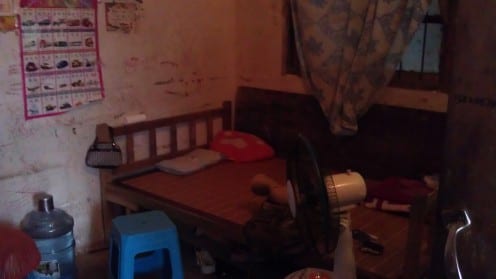Two worlds
By Xin Yuan Wang, on 5 September 2013
The more that I get to know people here in the South China fieldsite, the more I see the sharp distinction between their offline lives and online lives. It seems that there are actually two worlds, or two places where my informants live – one is a physical place, and the other social media.
My informant ‘CY’ is 18 years old, lives with her parents and her little brother and little sister. CY’s parents work in the same factory. The whole family lives in two small rooms – CY shares the bed with her little sister in the downstairs room (see image, above).
Every day the family wash themselves in a shared toilet which is without a shower. One plastic bucket and one plastic wash basin serves as a shower set. There is used toilet paper and dirty water on the floor, stains on the wall. However the toilet at home is still much better than the one at work, where people just don’t feel like flushing after using it, which is welcomed by swarms of flies. The air is thick with the stench of sewage and human waste and one has no problem of finding the toilet with the sense of smell hundreds of meters away. At daytime, even indoor temperature is above 38 degree, the air is so warm to the degree that I am afraid the only electric fan stops working because its engine is burning hot. One day, after work, CY was ‘playing’ her smartphone in her room while chatting with me from time to time. She was attracted into the ‘online world’ as if she had forgotten where she was; after a while; she looked up to see me – I was sitting there, sweating like a pig.
“Life outside the mobile phone is unbearable, hum?” she smiled.
Exactly. Life outside the mobile phone! I almost jumped up and cheered when I heard what she said. CY was right, there are two worlds , one is inside the mobile phone, and the other one outside the mobile phone. The one outside is a tedious place with the smell, high temperature and other chaos. To the contrary, the one inside with infinite space is free from any unpleasant smell and weather. CY’s QQ profile is neat, clean with the color of light blue and white. She updated her QZone (status and forward post) at least three times per day. Online CY is surrounded by a group of admirers and the way she talked is as if she was the princess who is waiting for true love. I have never seen CY talk like a princess in any face-to-face situation. In this big factory, there are hundreds of other ordinary young women just like CY, CY is just one of them and as such pretty ordinary; However, she is a princess in her ‘inside’ world online.
Of course the offline world and online world overlap in many cases; half of CY’s online status have a very close relationship with what just happened offline. And the one who interacts with CY most frequently online is her best friend who works in the next-door workshop of the same factory. A great part of the offline world (especially the not so pleasant part) is not reflected in her QQ profile at all. She knows each of her online friends offline, in which vein, one cannot view online and offline as separated in terms of participators. However, my point is that a significant part of my informants’ online world has nothing to do with their offline world, and in most cases, they prefer to ‘live’ in the online world which is much more interesting, pleasant, and purified.
 Close
Close






